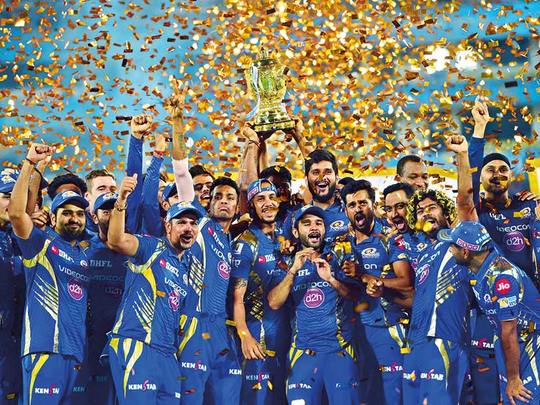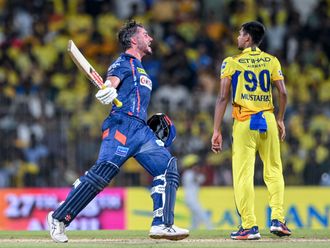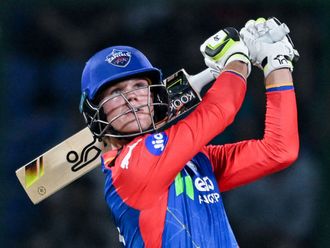
Dubai: The Indian Premier League (IPL), which has changed the landscape of cricket over the last decade, will be turning a new leaf when the 11th edition gets under way from April 4 to May 27 this year.
The return of Chennai Super Kings, one of the most successful and widely followed teams in the league, along with Rajasthan Royals after a two-year ban has set the build-up in motion — which will increase to fever pitch when more than 1000 players will be under the hammer in the auction in Bengaluru on January 27-28.
For Rajiv Shukla, the unflappable IPL chairman and Indian cricket board’s man for all seasons, it’s more than just another edition — what with a new revenue sharing model and numerous other challenges on the way, while the Board of Control for Cricket in India (BCCI) still grapples with the challenge of undertaking the reforms in the monolith.
In an exclusive interview with Gulf News during a recent personal visit to the Dubai, Shukla opened up about the upcoming edition of the IPL on a range of subjects — from the new revenue model to the somewhat sensitive issue of not inviting Pakistan players for the IPL auction. Excerpts:
Question: When the media rights for the IPL XI were sold to Star India for a staggering $2.55 billion (Dh9.37 billion) last September, you said there were more such surprises to follow. What else is in store?
Rajiv Shukla: Well, the IPL has been growing with each edition for the last 10 years, it has weathered many a storm to come to where it is. The biggest thing from the 11th edition is that the revenue model is getting changed — whereby the eight franchises will share 40 per cent of the profit, while the BCCI will get 60 per cent. This means the team owners don’t need to give license fees as they did for the first decade.
This new arrangement should see the earnings of each of the franchise owners jump from Rs700 million (Dh40.52 million) to around Rs3 billion, subject to the response to the eight vacant slots of sponsors. It’s a win-win situation really for the franchise owners, who may have often incurred losses in the past.
IPL right now is the biggest revenue earner for the Indian board and we want to channelise a part of our revenue to improve the lot of the cricketers. We have increased the players’ fee-cap from Rs650 million to Rs800 million per team in a season, while we want to build more stadia for the state units. Everybody should be happy with this.
The IPL has created a number of clones in other cricket-playing countries, though not all of them have been as successful. How difficult is it to sustain the momentum?
Our past experience has certainly helped along the way. What has certainly helped is the passion for cricket in India — a KPMG report says that the sport enjoys a 92 per cent viewership, while eight per cent watch other sport in the pie. Every year, the eyeball for IPL is also increasing, with the league attracting a fan base from all age groups now.
There are only two regions where we are still struggling to penetrate because of the time zones in Australia and New Zealand. The audience cannot watch the second game as it goes past midnight there.
Is there any chance of your tweaking the timings slightly this season?
We have often discussed about it, but it’s unlikely, as the broadcasters have to be agreeable. The early game (4pm IST) matches is another issue as they don’t get much eyeballs, hence we are trying to make an attempt to keep the day matches to a minimum — largely on the days of the double headers.
This is why when the idea of 10 teams came up last year, we were not very interested. The league runs for seven weeks as of now, so there could be also a fatigue factor if the action continues for more than two months.
While the IPL’s success story cannot be disputed, there is often a hushed complaint from other countries that you don’t release players for other leagues?
Our schedule is so hectic with our bilateral commitments etc that we are in no position to release players. On our part, we compensate the boards from whom we take players for the auction and have recently doubled our fees towards this end.
There is also a long-standing complaint of your ignoring Pakistan players for the auction. Don’t you think the presence of the likes of Mohammad Amir & co could have brought about a refreshing change?
I was expecting this question. You see, we are not against Pakistan in IPL as such as we are hiring commentators from there, teams are taking support staff, but the franchises need to be interested in taking Pakistan players before we include them in the auction. The security angle of these visiting players is also there.
A final question about the Lodha commission. It seems nothing much has moved in the past one year with the strength of the caretaker body, the Committee of Administrators (CoA), dwindling from four to two. When do we see normalcy returning to the BCCI and the elections taking place?
It’s a matter still pending with the Supreme Court where we have appealed for a few modifications in the recommendations. Whatever they decide, it will be binding upon us and then only we can convene a meeting for the Annual General Meeting (AGM).











